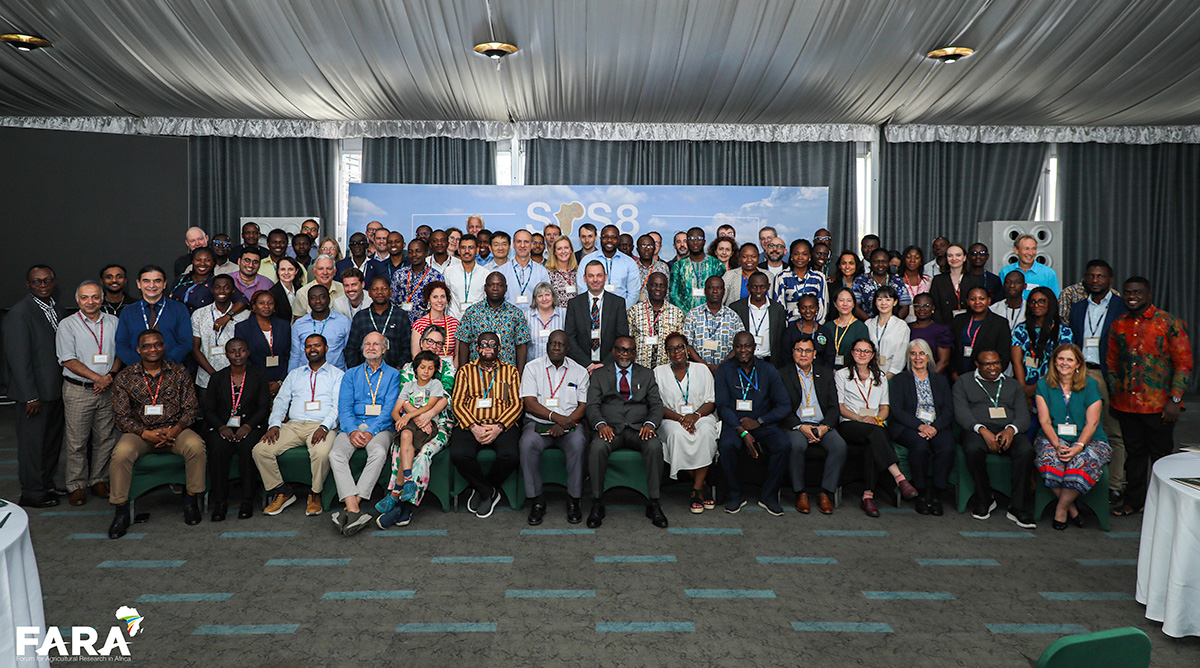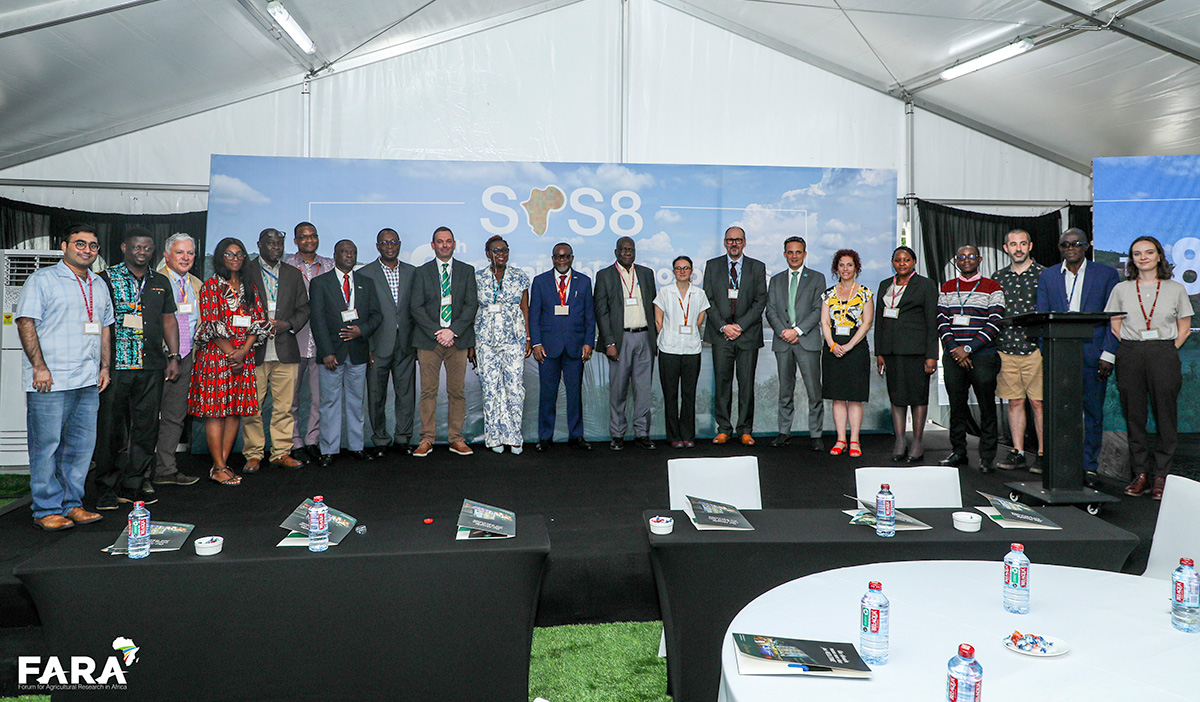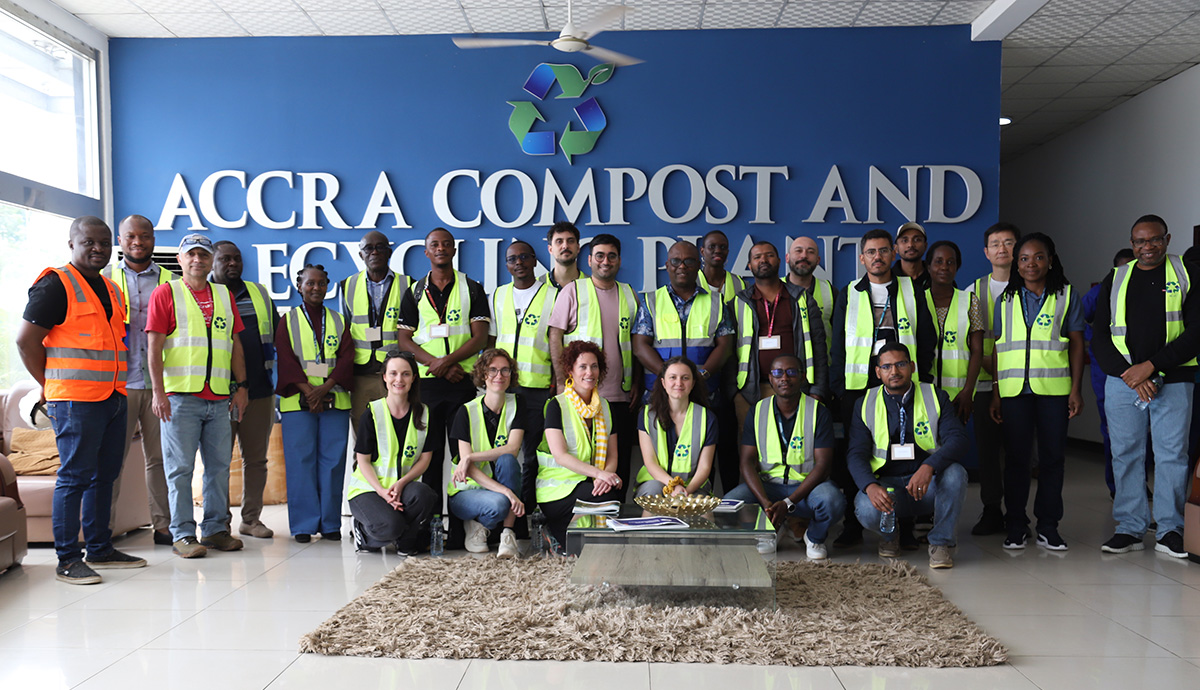The Sustainable Phosphorus Summit was recently held in Africa for the first time...
From 30 September-3 October, UKCEH co-convened the 8th Sustainable Phosphorus Summit (SPS8) in Accra, Ghana. SPS8 was a huge international effort, with co-conveners from the Council for Scientific and Industrial Research (CSIR) – Ghana, the Forum for Agricultural Research in Africa (FARA), UKCEH West Africa office, Lancaster University, and Rothamsted Research. Welcoming 120 in-person attendees alongside 548 online delegates, the event allowed the creation of new international connections, including stakeholders and experts, as well as the launch of the African Sustainable Phosphorus Network (ASPNet).
Read the full summit programme.

Why is phosphorus important?
Phosphorus is a key nutrient in crop and livestock production and is found in human and animal excreta as well as chemical fertilisers. While access to phosphorus fertilisers is needed to protect food security, excess amounts pollute aquatic ecosystems through agricultural run-off and wastewater, which can lead to the development of toxic algal blooms and contributes to biodiversity loss in freshwater and coastal ecosystems.
What is a Sustainable Phosphorus Summit (SPS)?
The SPS is an international, multi-stakeholder global series aimed at advancing research, dialogue and action for the sustainable management of phosphorus across the world. Since starting in 2010, the SPS series has been held every 2-4 years. It was brought to Africa this year for the first time, recognising the urgent need for action on sustainable phosphorus management on the continent.
SPS is not a traditional conference, but an innovative, inspirational, transformative cross-sector event, with a strong focus on showcasing the regional context of phosphorus in its host country and works to bring these contexts to the global community. SPS8 came at a time when global action on phosphorus is at a critical moment, with the United Nations Executive Director calling on countries to consider coordinated action to reverse phosphorus pollution and safeguard food security ahead of the 7th meeting of the United Nations Environment Assembly in December 2025.

Who was the organising team?
The event was a successful culmination of many months of collaborative work with partners, stakeholders and experts from 38 organisations and 20 countries in organising committees alone. The organising team was made up of 36 members of the International Expert Working Group (IEWG), including three co-chairs, nine members of the Local Organising Committee, and 11 members of the International Coordination Team.
This event was sponsored by Development Bank Ghana, University of Southern Denmark, Ragn-Sells, the African Plant Nutrition Institute, the Global Environment Facility through the uPcycle Project, and the Volta River Authority.
What happened at SPS8?
SPS8 focused on priority actions for achieving sustainable phosphorus management in Africa and globally. The summit enabled communities and sectors to work together fostering new opportunities for collaboration, innovation, and capacity development. The journey towards SPS8 was documented in a collaborative paper led by Dr Grace Kangara and Prof Bryan Spears.
The SPS8 was designed around six Global Phosphorus Challenges, which were co-developed by our network of experts:
- Phosphorus is critical in supporting global food security.
- Access to phosphorus is varied across the world and we need to improve access and benefits where needed, eg. Africa.
- Phosphorus pollution of water can result in biodiversity loss and human health impacts.
- There are complex interactions between phosphorus, nitrogen, carbon and climate.
- Sustainable mining and recycling are essential to preserve phosphorus for future generations.
- We need to improve our governance of phosphorus locally and globally.
Attendees were treated to traditional cultural performances by Odikro Royals at the opening ceremony, followed by addresses from Dr Collins Tay (Chairman of the Local Organising Committee, CISR) and Prof Harry Dixon (Associate Director of International Research and Development, UKCEH). The opening programme continued with UKCEH (Bryan Spears, Erica Zaja, Adelaide Asante) and Lancaster University (Phil Haygarth) lead representatives explaining the journey towards SPS8, and a keynote lecture by Dr Andre Bationo (International Fertilizer Development Centre); Sources and Sustainable Management of Phosphorus for Food Security in Africa.

Every conference session, one for each challenge, had a highlight talk and 4-5 short lightning talks, followed by a panel discussion. In total, the summit featured about 60 presentations.
Afternoons were dedicated to three working groups:
- Phosphorus action plan for Africa (including African Sustainable Phosphorus Network side event)
- Global phosphorus white paper
- Co-writing early career article: meeting the future needs of early career researchers in a changing world
You can read about the working groups and their facilitators on the SPS8 website.
The first day featured a partners and sponsors booth exposition and at the end of the second day we had a poster session with 20 posters, alongside a video of solidarity messages from UNEP, APNI, CSIR, FARA, DBG, Africa Soil Hub and the Soil Science Society of Ghana.
On the final day, delegates had a choice of three field trips:
- Accra Compost and Recycling Plant
- Volta River Authority (VRA)
- Cocoa Research Institute Ghana (CRIG)

The closing ceremony featured a summary of next steps for sustainable phosphorus management in Africa and globally, by the co-chairs of the IEWG, who underlined the crucial need for collaboration across research, government, NGOs, industry and academia as well as the commitment of SPS8 delegates to follow-through on the projects and connections fostered during the summit. This was followed by a communique on the establishment of the African Sustainable Phosphorus Network (ASPNet). The ASPNet will foster collective action for phosphorus sustainability across Africa.
How did we make SPS8 inclusive?
Delivering the benefits of sustainable phosphorus use from the local to global stages requires urgent actions across communities, research, industry, policy makers and the public. In recognition of this, UKCEH drafted sustainable phosphorus management inclusivity principles to guide the organisation and development of the summit.
With these principles in mind, the SPS8 organising committees strived to ensure equitable, multi-sector dialogue, knowledge exchange and representation at SPS8. To do this, financial support was offered to participants from low-income countries and early-career researchers. Successful candidates were selected by a sponsorship committee who reviewed questionnaires considering career stage, country of origin, and contribution to global phosphorus sustainability. To further support inclusivity, a special Visa-on-Arrival service was made available to all delegates, managed by the UKCEH West Africa Office, to minimise burden, time constraints and other potential barriers to attendance. We also enabled free online participation, organised by our partners at FARA, to allow the summit to reach wider audiences.
What comes next?
The vision for SPS Africa was to nurture local ownership and to foster new collaborations. We believe we achieved this through the creation of new international connections as well as launching the ASPNet.
The working groups will create a Global Phosphorus White Paper which will provide policy recommendations on phosphorus sustainability for governments; an early-career researcher-led article on the priority actions to support the next generation of sustainable phosphorus champions, and a road-map on achieving sustainable phosphorus management in Africa led by the ASPNet.
SPS9 will be organised by Dr Kazuyo Matsubae (Tohoku University) in Japan.
Written by Erica Zaja, Bryan Spears, Issy Lewis, Richard Padi
